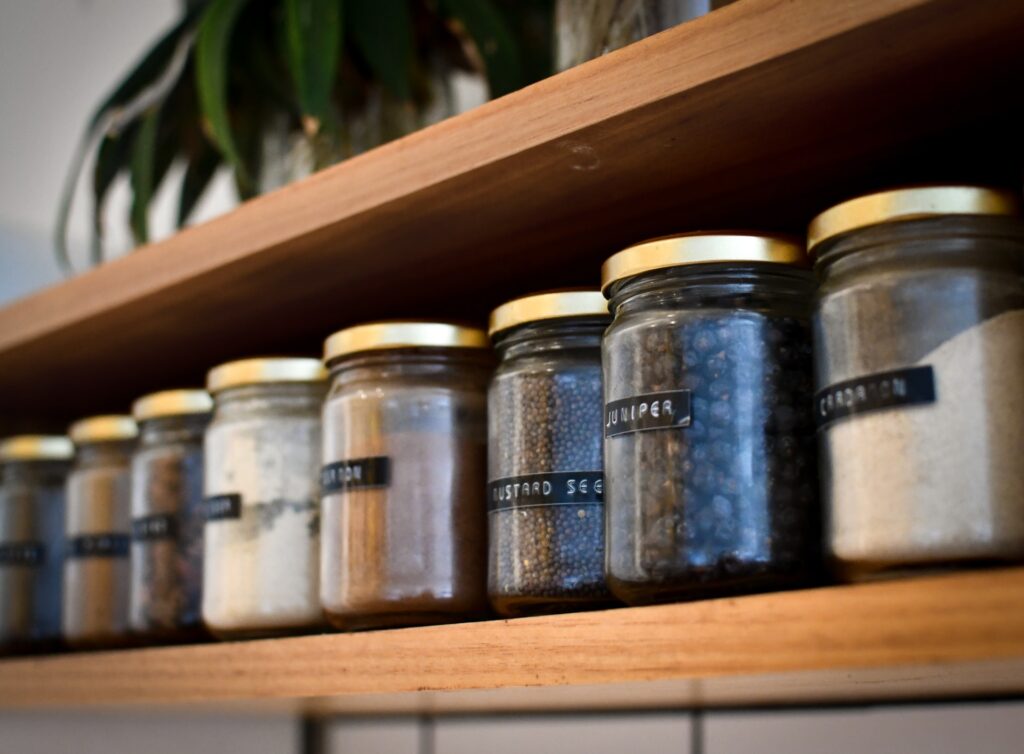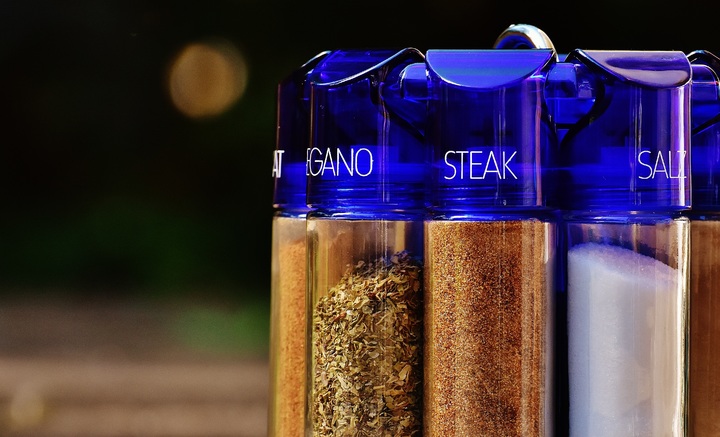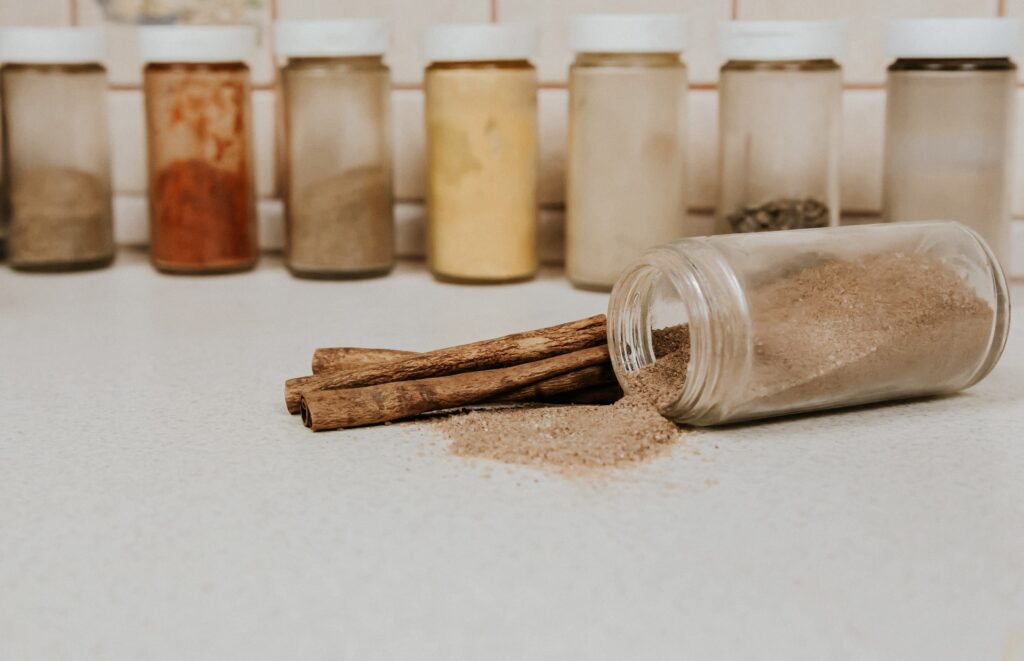Humidity plays a trick on spices. It causes severe clumping, and in the case of onion powder, total hardening. With this, you must know how to keep spices from clumping in humid climate. This is much so if you have a massive set of rubs and spice blends in your kitchen.
As someone who has been using and storing spices for years, I’ve come up with a solution to solve this problem. Below, I shared my kitchen hacks, so you can also keep your spices fresh, loose, and ready to use.
Why do spices clump?
Humidity is to blame for your clumping spices. The moisture in the air will cause the tiny bits to cling to each other, which leads to clumps. When this happens, it would be hard or impossible to dispense the spice using the shaker mesh of the jar.
In some cases, the spice will become stiff and can be broken down by simply shaking the jar. This is very common in garlic powder, which can be brick-hard if exposed to excessive moisture.
Aside from moisture, old age will also make your spices clump. As the spice loses its potency, it will start to decay and clump into pieces. This is why you shouldn’t purchase spices in large amounts if you’re not going to use them right away.
Moreover, the quality of the spices will also impact its susceptibility to clumping. Spices that aren’t properly dehydrated will clump easily when exposed to the smallest amount of moisture.
How To Keep Spices From Clumping In Humid Climate
Are you getting frustrated over your clumped spices? Here are a few methods to prevent this from happening in the future:
🌶️Store it in an airtight container.

The easiest solution to spice clumping is using airtight jars. Mason jars are the best storage for spices since the tight lid prevents moisture from entering the container.
For loose jar lids, I simply cut out a piece of plastic bag, place it on the jar’s opening, and then close the lid. This will give you a tight seal to prevent moisture from clumping the spices.
You can also use fabric toppers for your jar. Aside from absorbing moisture, it will also add a decorative touch to your spices.
🌶️Place it in a dry and cool spot.
Next, you should store your spice jars in a cool and dry area in your kitchen. Your pantry is the best place for this, but make sure that you keep moist or wet supplies away from the spices.
If you don’t have enough space in your pantry, you can keep your spices in a drawer or cabinet. These dark areas also help your spices last long.
🌶️Keep it away from the stove.
You’ll be surprised by how many home cooks make the mistake of putting their spices right above their stoves. Sure, it’s convenient when cooking, but it exposes the spices to excessive moisture.
The steam coming from the food you’re cooking can easily cause your spices to clump. And since you open the spices above the pot or saucepan, you’re directly allowing moisture to get into the spices.
If you want to keep your spices handy, just place them on the kitchen counter. This will keep it safe from the moisture coming from your stove or sink.
However, make sure that you place the spice jars in a rack to prevent them from falling. This is much so if you have young kids or curious pets at home.
🌶️Add some rice.

Here’s one trick that not many home cooks know of: adding a teaspoon of rice into their spices. I know it’s confusing, but let me explain.
Rice is known to absorb moisture, not just from your soaked phones or gadgets. In fact, most grains have this hygroscopic characteristic.
What happens is that rice will absorb the moisture that gets into your spices so it doesn’t clump. And when the rice gets exposed to the air, it will release the moisture to remain dry. Take note that this method is very effective for garlic or onion powder.
With this, you can add a teaspoon of uncooked rice into your spices. The shaker mesh will block the rice, so you don’t have to fish it out of your food.
🌶️Buy spices in small amounts.
Also, it’s wiser to buy spices in small amounts. That way, you can finish off the entire jar before humidity creeps in. Also, even if the spices clump, it’s only a small amount and easy to loosen up.
Buying spices in bulk is a money-saver, but storage can get tricky, especially if you live in a humid place. In the long run, clumping is a trade-off you’d have to deal with if you want to save some bucks.
🌶️Use a dehumidifier in your pantry.
If you have to buy and store spices in bulk, you should at least use a dehumidifier in your kitchen or pantry.
A dehumidifier will draw out excess moisture in the air. It can help restore a normal humidity level, so your spices and other similar supplies won’t clump.
Aside from that, dehumidifiers will prevent mold buildup in your kitchen, especially around the sink, where constant moisture is present.
You should ensure that the dehumidifier is properly sized for your kitchen or pantry for optimal efficiency. Also, you should use a humidistat to ensure that you’re not making your kitchen air too dry.
🌶️Place desiccants on your spice rack

If you can’t afford a dehumidifier, you can use desiccants as alternatives. Simply place these desiccant bags beside your spice jars. This will absorb moisture to prevent it from seeping through your spice jars.
You can use silica gel packs for this. If you want a safer option, consider activated charcoal bags. These two are effective in drawing out moisture in the area where the bags are placed.
Moreover, you should place the desiccant bags under the sun from time to time. This is to dry out the collected moisture so that the desiccants will serve their purpose properly.
How to loosen your clumped spices
If your spice has clumped due to moisture, there’s a way to ‘unclump’ it. Here are the methods I swear by:
Paper Towel Method
- Pour a small amount of clumped spices into a paper towel.
- Next, use a wooden spoon to press the clumped spice into the towel. Move the spoon around to crush the remaining. This will help unclump the powder while allowing the paper towel to absorb the moisture.
- After that, transfer the spice to your spice grinder. Run this for 10 to 15 seconds until your spices are back to their pulverized state.
- If you’re dealing with hardened onion powder, you can use a mortar and pestle to break down the stiff clumps.
- You should store the unclumped spice in a dry jar. Use a tightly sealed lid to prevent moisture from entering the container.
The Toast Method
If there’s excessive moisture in your spices, the paper towel method may not be enough. In this case, it’s best to toast your spices to remove the moisture and restore their powder form.
For this method, here are the steps to take:
- Put your clumped spices into a grinder to break down the large chunks.
- After that, transfer the spices into a non-stick skillet.
- Toast the spices in medium heat to dry out the moisture. Make sure that you shake the pan or stir the spices to prevent it from burning. Do this for one to two minutes.
- After that, let the spice cool down before transferring it to a dry and airtight jar.
The Oven Method
This method is quite similar to the toast method since you’re going to use heat to unclump the spices. This is very effective for hardened garlic powder and other powdered seasonings:
- Put the clumped spices in a pan.
- Flake it with a fork to break down the softer chunks.
- After that, place the pan inside the oven for around 10 minutes in low to moderate heat. Always check the spice to ensure that it won’t burn.
- Next, take the pan out of the oven and let it cool down.
- The last step is to put the spice in a grinder to ensure that it’s properly pulverized. Store it in a dry jar afterward.
When should I throw away clumped spices?
Just because your spices clumped doesn’t mean you’re going to throw it away. However, if the spices have been left untouched on your shelf for two to four years, it’s best to dispose of them. This is much so if the spice has been opened already.
Take note that aside from clumping, moisture will also cause molds. So if your spices are clumping, you should also check if there is discoloration that could indicate the presence of mold.
If you confirm that there are molds in your spices, you’d have to dispose of them. In this case, your spices are no longer safe to consume even if you toast them or heat them in the oven.
Does clumping affect the spice flavor?
Usually, clumping won’t make your spices go bad. However, it’s not good either.
You can try the methods I discussed above and see if your spices taste differently. If it does taste awful, it’s probably a sign that you should dispose of the spice.
If a change in color and consistency accompanies clumping, you should consider replacing your stock. Such changes are potential signs of spoilage or poor quality.
Frequently Asked Questions
Q: Why are my seasonings clumping?
A: The main culprit to clumping seasonings is moisture. It’s either water got into your spices, or that humidity is too high in your home. Even if your spices are contained inside jars, moisture can still seep through and cause clumping.
Q: Do spices need to be airtight?
A: As much as possible, you should keep your spices in airtight containers to prevent clumping. This will also keep the spices fresh and flavorful. Cooks often use mason jars and metal tins to ensure that their spices are protected against moisture.
Q: Do I need to refrigerate my spices?
A: It’s not a wise idea to refrigerate your spices as the fridge is mired with moisture. Instead, you should keep it in a cool and dark area in your kitchen, like cabinets or drawers. However, the exception here is red-colored spices like chili or paprika. You can put these on the fridge during humid days to retain their optimal potency.
Q: Should I throw out clumped spices?
A: You don’t have to throw away clumped spices. There’s a way to loosen this, so you can still use it for your next recipes. You can grind it using your electric spice grinder to tear down any chunks. Most clumped spices are still flavorful and safe to use for cooking.
Q: How long can spices be stored?
A: In general, whole spices can last for up to 4 years. However, organic ones tend to have a shorter shelf life. Take note that exposure to light, air, and moisture will reduce the lifespan of your spices. Also, the shelf life depends on the type of spice you have.
Q: Does iodized salt clump?
A: Unlike other spices, iodized salt doesn’t clump. This is because iodized salt contains an anti-caking agent that prevents the potassium iodide content from being prone to clumping. It explains why your other spices clump and your iodized salt doesn’t.
Final words
Knowing how to keep spices from clumping in humid climate will save you from the hassle. It will also keep your spices fresh and safe from potential mold growth.
Nevertheless, if your spices are clumping, there are ways to revive their original form. You can crush it manually, toast it on a skillet, or heat it in the oven. A spice grinder can also help break down large chunks.
Do you have other hacks to add to this post? Share it with us below!
